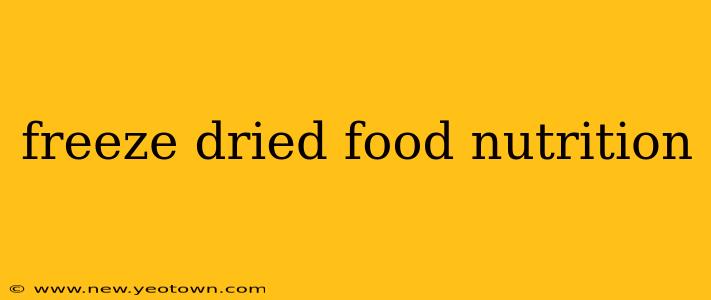The crisp crackle of a freeze-dried meal bag, the promise of a hot, satisfying dinner miles from the nearest grocery store – that's the magic of freeze-dried food. But beyond the convenience and portability, a crucial question arises: what about the nutrition? Is freeze-dried food as nutritious as its fresh counterpart? Let's dive into the world of freeze-dried nutrition, separating fact from fiction.
What is Freeze-Drying, and How Does it Affect Nutrition?
Imagine this: instead of cooking your food, you slowly freeze it, then carefully remove the water using a vacuum. That’s the essence of freeze-drying. This process, unlike canning or other preservation methods, significantly reduces water content without using high heat. This is key because high heat degrades vitamins and minerals.
Because the water is removed under carefully controlled conditions, the cell structure of the food remains largely intact. This preserves the shape, color, and, importantly, much of the nutritional value. However, some losses are inevitable.
Does Freeze-Dried Food Lose Nutritional Value?
Yes, some nutrient loss does occur during freeze-drying. However, the extent of the loss depends on several factors including the specific food, the processing method, and storage conditions. Generally speaking, freeze-dried foods retain a higher percentage of their original nutrients compared to canned or processed foods.
What Nutrients Are Retained Well?
Freeze-drying excels at preserving many essential nutrients, including:
- Proteins: Proteins generally fare well during the freeze-drying process.
- Carbohydrates: The majority of carbohydrates remain intact.
- Fats: Similar to proteins, fats are generally well-preserved.
- Some Vitamins & Minerals: Many vitamins and minerals, particularly those less susceptible to heat and oxidation, remain stable.
What Nutrients Might Be Affected?
Some vitamins and minerals are more sensitive to the freeze-drying process and may experience some degradation:
- Water-soluble vitamins: Vitamins like Vitamin C and some B vitamins are more prone to loss due to their solubility in water.
- Heat-sensitive vitamins: Certain vitamins can be affected even by the relatively low temperatures involved in freeze-drying.
It's important to remember that even fresh foods lose nutrients during harvesting, transportation, and storage. Therefore, it's not just about comparing freeze-dried to fresh, but about understanding the overall nutritional profile within its context.
How to Maximize Nutrient Retention in Freeze-Dried Foods?
Choosing high-quality freeze-dried foods is the first step. Reputable brands prioritize careful processing to minimize nutrient loss. Here are a few additional tips:
Proper Storage:
Store freeze-dried foods in airtight containers in a cool, dark, and dry place to prevent nutrient degradation and spoilage.
Rehydration Methods:
Follow the manufacturer’s instructions carefully regarding rehydration. Over-rehydrating can lead to nutrient leaching.
Are Freeze-Dried Foods a Healthy Choice?
Yes, when compared to many other processed foods, freeze-dried foods can be a healthy and nutritious option. They are lightweight, convenient, and offer a relatively long shelf life. However, it is important to select varieties that are low in added salt, sugar, and unhealthy fats. Read nutrition labels carefully!
How Do Freeze-Dried Foods Compare to Canned Foods?
Freeze-dried foods generally retain more nutrients than canned foods due to the lower heat exposure during the preservation process. Canned foods often undergo high-heat processing, which can significantly reduce the vitamin and mineral content.
Are Freeze-Dried Meals Convenient for Camping or Hiking?
Absolutely! Freeze-dried meals are incredibly lightweight and compact, making them ideal for backpacking, camping, and other outdoor adventures. They require only hot water to prepare, making them very easy to cook in the field.
What are the Benefits of Freeze-Dried Food for Emergency Preparedness?
Freeze-dried foods have a very long shelf life when stored properly, often lasting for years. This makes them an excellent choice for emergency food supplies.
In conclusion, freeze-dried foods offer a convenient and relatively nutritious way to preserve food. While some nutrient loss is inevitable, the overall nutritional profile, ease of use, and long shelf life make them a valuable option for everyday use and emergency preparedness. Always choose reputable brands, pay attention to storage and rehydration techniques, and carefully review the nutrition label before incorporating them into your diet.

